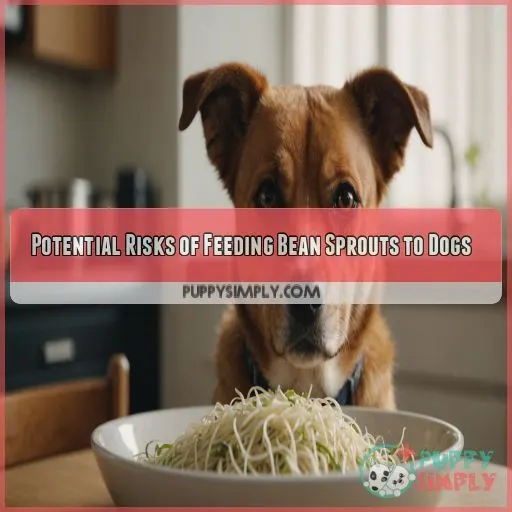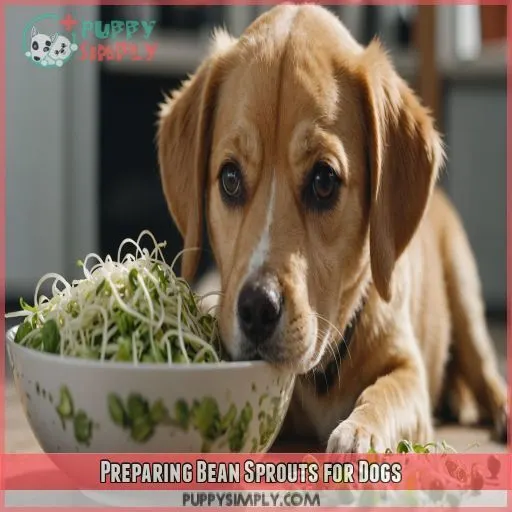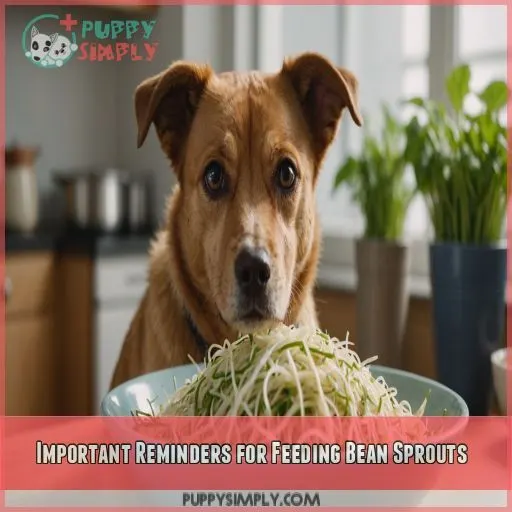This site is supported by our readers. We may earn a commission, at no cost to you, if you purchase through links.

The short answer is yes! Bean sprouts are a nutrient-rich, low-calorie snack that can support your dog’s immune system and even help prevent certain illnesses. They’re easy to digest, rich in vitamins and minerals, and can even give your pup a shiny coat.
However, there are some potential risks to keep in mind, like choking hazards and allergies.
Don’t worry, with proper prep and moderation, bean sprouts can be a great addition to your dog’s diet. Want to learn the best ways to make them a safe and yummy snack?
Table Of Contents
- Key Takeaways
- Nutritional Benefits of Bean Sprouts for Dogs
- Potential Risks of Feeding Bean Sprouts to Dogs
- How to Safely Feed Bean Sprouts to Dogs
- Can Dogs Eat Raw Bean Sprouts?
- Can Dogs Eat Cooked Bean Sprouts?
- 1 Choose the right sprout variety for your dog’s size.
- 2 Opt for steaming over boiling to preserve simple nutrients.
- Bean Sprouts as a Snack or Topping
- Comparing Bean Sprouts to Other Dog-Friendly Vegetables
- Preparing Bean Sprouts for Dogs
- Important Reminders for Feeding Bean Sprouts
- Frequently Asked Questions (FAQs)
- Is bean sprout safe for dogs?
- Can I give my dog sprouts?
- How do you cook bean sprouts for dogs?
- Are cooked bean sprouts safe to eat?
- Can dogs with kidney disease eat bean sprouts safely?
- How often can dogs eat bean sprouts in a week?
- Can bean sprouts cause gas and bloating in dogs?
- Are canned bean sprouts safe for dogs to eat?
- Can dogs eat bean sprouts that are past expiration date?
- Conclusion
Key Takeaways
- Bean sprouts are a healthy, low-calorie snack for dogs, packed with vitamins and minerals that boost their health and immunity.
- There are potential risks, such as choking and allergies, so always chop them finely and introduce them gradually.
- Moderation is key to avoid gastrointestinal upset, and they should be washed and cooked properly to minimize any health hazards.
- Always consult your veterinarian to determine the best approach for your dog’s unique diet and needs.
Nutritional Benefits of Bean Sprouts for Dogs
You’re probably wondering if bean sprouts are a nutritious and safe addition to your furry friend’s diet. The good news is that bean sprouts are packed with vitamins and minerals, low in calories, and easy to digest, making them a great snack or topping for your dog – in moderation, of course!
Rich in Vitamins and Minerals
Bean sprouts are a vitamin-rich treat for dogs, packed with essential minerals like iron, calcium, and folate that support a healthy coat and overall canine health.
Low in Calories
Bean sprouts are super low in calories, making them a great snack for dogs on a weight management plan – just be mindful of portion sizes!
Easy to Digest
Bean sprouts are easy on your dog’s digestive system, thanks to their low fiber content and prebiotic properties that promote gut health and calm sensitive stomachs.
Antioxidant Properties
You’ll love that bean sprouts’ antioxidant properties shield your dog’s cells from free radical damage, supporting their immune system and overall health and well-being.
Promote Healthy Skin and Coat
You want your furry friend to shine? Bean sprouts can help promote a healthy skin and coat, giving your dog a vibrant, shiny fur coat.
Potential Risks of Feeding Bean Sprouts to Dogs
As you’re considering adding bean sprouts to your dog’s diet, it’s important to be aware of the potential risks involved. While bean sprouts are generally nutritious, they can pose some health hazards for dogs if not introduced properly or in excess, so it’s key to understand these risks to keep your furry friend safe.
Choking Hazard
When feeding bean sprouts to small dog breeds, be aware of the choking hazard, especially with raw sprouts; supervise and opt for cooked, chopped alternatives.
Gastrointestinal Upset
Watch for gastrointestinal upset symptoms like diarrhea, gas, or irregular bowel movements, especially if your dog eats too many bean sprouts or has sensitive stomach.
Allergic Reactions
Some dogs can be allergic to bean sprouts, so watch for symptoms like itching, scratching, or digestive issues, and consult your vet if necessary.
- Symptoms may vary by dog breed, but common signs include:
- Itchy skin or ears
- Digestive upset, like diarrhea or vomiting
- Increased scratching or chewing at paws or skin
Pesticide Residues
When shopping for bean sprouts, opt for organic options and wash them thoroughly to minimize pesticide residues, ensuring a safer snack for your furry friend.
Mold Growth
When it comes to mold growth on bean sprouts, you want to be vigilant! Check for visible signs, and store them properly to prevent toxicity.
How to Safely Feed Bean Sprouts to Dogs
You’re ready to add bean sprouts to your furry friend’s diet, but first, let’s talk about how to do it safely. From washing and chopping to introducing them in moderation, we’ve got the lowdown on how to make bean sprouts a healthy and happy addition to your dog’s meals.
Wash Thoroughly
Before feeding bean sprouts to your dog, make sure to wash them thoroughly to remove pesticide residues, bacteria, and mold, ensuring a safe snack for Fido.
Here are 4 easy steps to wash bean sprouts:
- Rinse with cold water: Run cold water over the bean sprouts to remove any loose debris.
- Soak in water: Soak the bean sprouts in water for 5-10 minutes to loosen dirt and bacteria.
- Use a vinegar solution: Mix 1 tablespoon of apple cider vinegar with 2 cups of water and soak the bean sprouts for 5 minutes.
- Drain and rinse: Drain the bean sprouts and rinse with cold water to remove any remaining vinegar taste.
Chop Into Small Pieces
Now that you’ve washed those bean sprouts thoroughly, chop them into small pieces to prevent choking hazards, especially if you have a small dog.
Start With Small Amounts
When introducing bean sprouts to your dog’s diet, start with small amounts (about 1/4 teaspoon per 10 pounds of body weight) to gauge individual tolerance.
Monitor for Adverse Reactions
StartWhen introducing bean sprouts with, a monitor small your amount dog and closely monitor for your signs dog of’s trouble reaction,, watching like for diarrhea signs, like vomiting diarrhea,, skin vomiting rash,, skin leth rasharg,y leth,arg ory loss, or of loss appetite of – appetite act.
fast!
Diarr Watchhea for or gastrointestinal upset vomiting can be, a sign and that have your a dog’s plan digestive in system place isn in’t toler case yourating dog experiences adverse the effects.
- Be aware of any bean changes in sprouts your
dog*’s A skin mood rash or, appetite itching, may indicate or an stool allergic quality reaction.
** L Ifeth yourarg dogy’s or loss symptoms of persist appetite or can signal wors aen more, serious issue don with’t blood hesitate sugar or to blood seek pressure veterinary
- care Changes.
in* behavior, Keep such an as eye nervousness on or your anxiety dog, can’s be blood sugar and a blood sign pressure of a levels vitamin, K as deficiency or these impact can on be bone affected health
Consult Your Vet
Now that you’re monitoring for adverse reactions, it’s time to consult your vet to determine the best approach for your furry friend’s bean sprout adventure.
Can Dogs Eat Raw Bean Sprouts?
You’re considering adding raw bean sprouts to your dog’s diet, but you want to make sure it’s safe and beneficial for them. Let’s explore the pros and cons of feeding raw bean sprouts to your furry friend, so you can make an informed decision.
Risks of Raw Bean Sprouts
Raw bean sprouts can pose risks for your furry friend. Watch out for pesticide residues, mold growth, and bacterial contamination. Choking hazards and allergic reactions are also concerns. Handle with care, especially with small breeds prone to gobbling them down whole.
Benefits of Raw Bean Sprouts
Raw bean sprouts can be a nutrient-rich addition to your dog’s diet, offering benefits like antioxidants, vitamins, and fiber. However, you should think about these benefits alongside potential safety concerns, such as digestion issues and sprout safety risks.
Preparing Raw Bean Sprouts
You want to give yourWhen furry friend preparing raw raw bean bean spr sproutsouts? for Here your are dog some, prep remember tips:
to keep in Wash mind those:
sprouts Wash like those they’re covered in dirt ( sprtheyouts probably are!)
- Chop them into like teen your lifey depends pieces on it (your pup’s does)!
- Cut them to into avoid teen chokingy hazards-t
iny pieces to Store avoid them choking in hazards the
fridge to keep ’em fresh! Store them in the fridge, duh!
Can Dogs Eat Cooked Bean Sprouts?
You’re thinking about cooking bean sprouts for your pup, but you’re wondering if they’re still good for them. Cooked bean sprouts can be a great option for dogs because they’re easier to digest than raw ones. But it’s important to make sure you cook them the right way to keep all the good stuff in them and avoid any problems.
Benefits of Cooked Bean Sprouts
Cooked bean sprouts offer numerous benefits for dogs, including improved digestive health and enhanced vitamin content. Cooking methods like steaming or boiling can make them easier to digest.
Preparing Cooked Bean Sprouts
1 Choose the right sprout variety for your dog’s size.
2 Opt for steaming over boiling to preserve simple nutrients.
- Generally preferred over boiling. Adjust cooking time to make sure you don’t lose nutrients.
- Select the right sprouts: Consider your dog’s size and the sprout variety.
- Keep it salt-free: Use recipes without salt, onions, or garlic.
- Watch the clock: Cooking time is key to retaining nutrients.
Reducing Vitamin C Content
| Cooking Method | Vitamin C Retention |
|---|---|
| Steaming | 80-90% |
| Boiling | 50-60% |
| Microwaving | 60-70% |
| Stir-frying | 40-50% |
Opt for steaming to keep those vitamins intact!
Bean Sprouts as a Snack or Topping
You can use bean sprouts as a nutritious snack or topping for your dog’s meals.
But remember to serve them in moderation due to their high fiber content.
Just sprinkle a few cooked bean sprouts over your dog’s regular meal for a healthy boost.
Be sure to consult with your veterinarian for guidance on the right amount and frequency for your furry friend.
Healthy Snack Option
You can give your furry friend a tasty, healthy snack by sprinkling a small handful of cooked, chopped bean sprouts on top of their regular meals. Just be sure to introduce slowly.
Nutritious Boost
Adding bean sprouts as a topping gives your dog a nutritious boost. Here are three benefits:
- Rich in Vitamins: Boosts immune system.
- Easy to Digest: Gentle on stomachs.
- Shiny Coat: Promotes healthy skin.
Moderation is Key
When using bean sprouts as a snack or topping, remember that moderation is key. Start with small amounts to gauge your dog’s individual tolerance, taking into account their weight and health concerns.
| Dog’s Weight | Bean Sprout Frequency | Sprout Serving Size |
|---|---|---|
| Small (under 20 lbs) | 1-2 times a week | 1/4 cup chopped |
| Medium (21-50 lbs) | 2-3 times a week | 1/2 cup chopped |
| Large (over 50 lbs) | 3-4 times a week | 3/4 cup chopped |
Consult With Your Veterinarian
Before making bean sprouts a regular snack or topping, consult with your veterinarian to determine the safe dosage for your dog, considering their specific needs, allergies, and existing conditions.
Comparing Bean Sprouts to Other Dog-Friendly Vegetables
As you consider adding bean sprouts to your dog’s diet, you’re probably wondering how they stack up against other dog-friendly vegetables. Let’s compare the nutritional benefits of bean sprouts to those of broccoli, carrots, spinach, green beans, and sweet potatoes – all popular veggie options for your furry friend.
Broccoli
Let’s talk broccoli! Rich in vitamins and fiber, it’s a great alternative snack for dogs, but beware of potential stomach upset if fed excessively.
Carrots
Carrots for dogs are a great snack option, offering a boost of vitamin A and fiber, supporting healthy vision and digestion.
Spinach
Spinach is a nutrient-packed superfood for dogs, rich in vitamins A, C, and K, as well as iron and folate, supporting healthy digestion and immunity.
Green Beans
Considering green beans for your pup? They’re a low-calorie, nutrient-rich snack, easy on their tummies. Steam or cook them as a tasty treat.
Sweet Potatoes
When comparing sweet potatoes to bean sprouts, note they’re rich in vitamins A, C, and E, and fiber, but consult your vet for serving guidance.
Preparing Bean Sprouts for Dogs
As you get ready to add bean sprouts to your dog’s diet, it’s important to prepare them safely to avoid any adverse reactions. You’ll want to introduce bean sprouts gradually, monitor your dog for any signs of gastrointestinal upset, and choose a cooking method that retains their nutritional value without adding toxic ingredients.
Introduce Gradually
When introducing bean sprouts to your dog’s diet, start small and build tolerance. Begin with a tiny amount and gradually increase it, always trusting your vet’s guidance and observing changes.
Monitor for Reactions
When introducing bean sprouts to your dog’s diet, monitor for reactions like diarrhea, vomiting, gas, allergies, or skin irritation. Watch closely and adjust their bean sprout intake accordingly.
- Keep an eye out for changes in stool quality or appetite
- Watch for signs of gas or bloating
- Monitor for allergic reactions, like itching or hives
- Be prepared for possible skin irritation or redness
Cooking Methods
You’re ready to cook those bean sprouts for your furry friend. Steaming is the best way to preserve nutrients, but boiling, roasting, microwaving, or sautéing are also safe options.
Avoid Toxic Ingredients
When cooking bean sprouts for your dog, avoid adding toxic ingredients like onion, garlic, salt, or seasonings. Here are some no-nos to keep in mind:
- Don’t even think about adding chocolate for flavor – it’s toxic to dogs!
- Garlic and onion are off-limits, as they can cause anemia.
- Salt is a no-go, as it can lead to electrolyte imbalances.
- Xylitol, a sugar substitute, is also a major no-no for your furry friend.
Important Reminders for Feeding Bean Sprouts
As you think about adding bean sprouts to your dog’s diet, remember to take your dog to the vet regularly to keep them healthy. It’s also important to think about any health problems your dog already has and make sure the bean sprouts fit in with what they usually eat. This helps avoid any problems.
Regular Veterinary Checkups
As you introduce bean sprouts to your dog’s diet, remember that regular veterinary checkups are really important for keeping an eye on their overall health. Schedule frequent visits to make sure your furry friend is doing well and adjust their bean sprout intake as needed.
Consider Your Dog’s Health Conditions
Before adding bean sprouts to your dog’s diet, consider their pre-existing conditions, allergies, and digestion issues. Certain health conditions or medications may interact with bean sprouts, so get your vet’s approval to make sure it’s a safe and healthy snacking experience.
Balance With Existing Diet
When introducing bean sprouts, balance them with your dog’s existing diet to avoid upsetting their stomach. Consider their meal planning, dietary needs, food sensitivities, and portion control to make sure things go smoothly and to pick the best treats.
Frequently Asked Questions (FAQs)
Is bean sprout safe for dogs?
Imagine this: over 75% of dogs experience digestive issues, and you’re wondering if bean sprouts are safe for your furry friend. The answer is yes, in moderation, as long as you wash them thoroughly and chop them into bite-sized pieces.
Can I give my dog sprouts?
You can give your dog sprouts, but do it safely! Start with small amounts, chop them up to avoid choking hazards, and cook them without toxic ingredients like onions or garlic to make sure they digest easily.
How do you cook bean sprouts for dogs?
You’re cooking bean sprouts for your furry friend? Simply steam them without salt or seasonings, and chop them into bite-sized pieces to prevent choking. This way, you’ll retain their nutrients and make them easy to digest.
Are cooked bean sprouts safe to eat?
You’re wondering if cooked bean sprouts are safe to eat. Yes, they’re – as long as you cook them without adding toxic ingredients like onions or garlic. Steaming without salt is your best bet!
Can dogs with kidney disease eat bean sprouts safely?
You’re wondering if bean sprouts are safe for your furry friend with kidney disease. Generally, they can be a nutritious addition in moderation, but consult your vet first to determine the best approach for your pup’s specific needs.
How often can dogs eat bean sprouts in a week?
You can safely give your dog bean sprouts 2-3 times a week, but in moderation. Start with small amounts (about 1/4 cup) and monitor their digestive health. Adjust the frequency and serving size based on your dog’s individual needs.
Can bean sprouts cause gas and bloating in dogs?
You’re worried about your furry friend turning into a gas balloon after munching on bean sprouts! Relax, while bean sprouts can cause gas and bloating in dogs, moderation is key – just a small amount as an occasional treat.
Are canned bean sprouts safe for dogs to eat?
If you’re thinking about giving your dog canned bean sprouts, be careful. While they’re not toxic, many canned goods have added salt, which can be a problem for dogs. Always rinse them thoroughly and talk to your vet before giving them to your pup.
Can dogs eat bean sprouts that are past expiration date?
Don’t be a ‘bean counter’ when it comes to your pup’s health! If bean sprouts are past their expiration date, it’s best to err on the side of caution and discard them to avoid any potential risks to your dog’s safety.
Conclusion
Bean Sprouts: A Super Snack for Your Pup?
Turns out, your pup can join in on the bean sprout goodness! These sprouts are a healthy, low-calorie snack packed with vitamins and minerals that boost your dog’s health in many ways. But, as with any new food, there are risks and prep rules to know. Choking and allergies are potential issues, so always chop sprouts finely and introduce them gradually. Remember, moderation is key, and talk to your vet to make sure bean sprouts fit in with your dog’s unique diet and needs.















